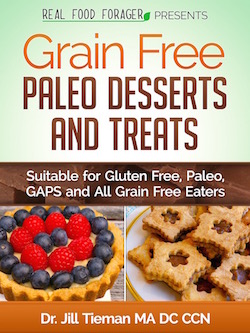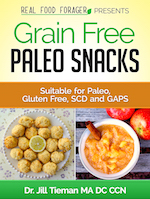If you have been reading this blog for a while you know that I am a strong proponent of the grain-free diet. I truly believe that most people are much better off with grains out of the diet. This has not only been my personal experience, but the experience of many of my patients and others around the world. The problems with wheat and gluten grains are even becoming recognized by main stream medicine.
Recently, Dr. David Perlmutter released his groundbreaking book, Grain Brain, about the effects of grains on the brain, that is based on recent documented scientific research. The book is getting a lot of attention from everyone and even mainstream medicine. He’s been interviewed dozens of times at alternative summits (like The Future of Nutrition and The Gluten Summit) and I heard him being interviewed at Medscape, an online site for medical information. Dr. Perlmutter is a practicing neurologist with expertise in neuro-degenerative diseases, like Alzheimer’s, dementia and Parkinson’s.
The Effects of Gluten on the Brain
It appears that a sensitivity to gluten can set a person up for brain related conditions from Alzheimer’s and dementia to depression, headaches and even schizophrenia.
While some people continue to think that properly preparing grains by sourdough fermentation, soaking and/or sprouting) is the simple fix to this problem, the reality is that the immune response to gluten is much more complicated. While proper preparation of grains is very important for the people who can tolerate them, those who have an immune reaction to gluten will be creating inflammation that can affect all areas of the body from the digestive tract to the joints, the skin and the brain.
Inflammation is the Most Basic Causative Disease Agent
Inflammation is the cornerstone of Alzheimer’s, Parkinson’s and MS — all the chemical markers of inflammation are the same whether the inflammation is in a joint or in the brain. Elevated blood sugar drives inflammation.
When blood sugar is even mildly elevated it raises glycation. The glycation process is when sugar binds to proteins. When this happens it increase free radicals and the glycated proteins increase the process of inflammation. This is devastating for the human brain.
Inflammation is fundamental to the cause of Alzheimer’s, (also known as diabetes type 3). Studies back up what Dr. Perlmutter is saying about sugar and it’s relationship to inflammation. A high carb diet leads to modification of proteins (glycation) that leads to damage to DNA.
Read more about what Dr. Perlmuter, a practicing neurologist, has to say about the relationship of sugar and carbohydrates to brain conditions.
The Effects of Gluten on the Heart
Dr. Mark Houston spoke at the Gluten Summit which is where I heard his talk. He is the Associate Clinical Professor of Medicine at Vanderbilt University School of Medicine, Director of the Hypertension Institute and Vascular Biology, Medical Director of the Division of Human Nutrition at St. Thomas Medical Group, and a cardiologist who specializes in nutrition.
According to Dr. Houston, coronary heart disease (CHD) starts in utero when the mother is exposed to poor nutrition, malnutrition and toxins. Environment and genetics also play a role in the progression. In today’s American teenagers, there is a 30% incidence of subclinical coronary heart disease (CHD). Contributing factors are obesity, metabolic syndrome, type 2 diabetes, and sedentary lifestyle.
The two predominate mitigating factors are poor nutrition and lack of proper exercise. They are simply just eating too many fast foods and frozen foods and not enough fresh vegetables and not getting proper exercise.
There is a correlation between gluten sensitivity which occurs in the gut and Celiac and metabolic syndrome. There is also a connection to vascular problems, endothelial dysfunction, coronary heart disease, congestive heart failure and arrhythmias of the heart.
Autoimmune disease is a newly considered factor in the development of endothelial dysfunction (the endothelium is the inner lining of the blood vessel), peripheral vascular disease, coronary heart disease, heart failure, and other types of cardiovascular illness.
When there are anti-bodies to tissue transglutaminase, (a blood marker of gluten intolerance for Celiac) — those antibodies can also affect the inner lining of the blood vessels, the endothelium.
When the gluten sensitive patient eats gluten, the body sees this as an invader and responds in the three ways outlined above; inflammation, oxidative stress and vascular autoimmune dysfunction.
The blood vessel is an innocent bystander and it develops disease in response to the assault from the response to gluten. It is gluten that is the trigger.
Gluten-Free is Just Not Enough
Grains are just like legumes, beans and nuts — they all have anti-nutrients in them, such as enzyme inhibitors, lectins and phytates. These substances protect the grain, but at the same time they make them very hard to digest. Therefore, they become irritating to the digestive tract when they are not properly prepared by soaking, sprouting or sourdough fermentation.
Have you ever seen a commercially prepared gluten-free product that has been soaked, sprouted or sourdough fermented? I haven’t — and I don’t think it exists. There are some properly prepared breads that may be available from your local farmer. Biodynamic farmers also use ancient or heritage grains like Einkorn or Emmer. If I were eating wheat, these are the grains I would use and I would make my own bread.
Have you seen those ingredient labels on most of the gluten-free products? They read like any other commercial processed product. There may be lecithin, guar gum (polysaccharide thickener), ammonium bicarbonate (leavening agent), sodium bicarbonate (baking soda), mono and di-glycerides (emulsifier from GM soybeans) as well as dextrose (sugar), modified corn starch (GMO thickener and may not be gluten-free) and natural flavors.
Do you really want to be feeding these substances to your family on a daily basis? It is especially concerning if there is someone that has a digestive problem and may have a damaged gut.
Most gluten-free products are made with other starches that are hard to digest. If you read the label it will have a list of other starches such as, rice, corn, potato and maybe other non-gluten grains. Again where applicable, these will not have been properly prepared and it just amounts to more starchy foods that are hard to digest and quickly turn into sugar.
There are many other connections to diseases and gluten. See below for links to those articles.
The Solution
You need to go beyond gluten-free, you need to go grain-free. A grain-free diet has been used to improve many conditions — including diabetes, digestive conditions, heart disease and dementia. You can be assured that there will be no gluten if you follow a grain free diet. For many, gluten free is just not enough to heal.
As mentioned above, most gluten-free products are filled with empty calories, no nutrition, toxic additives and genetically engineered ingredients.
When you make something at home from simple, healthy, real food ingredients, sourced from reputable manufactures, you can be assured that nothing else is in it and that it is of the highest quality.
I know you want to feed your family the very best. It’s easy, once you get the hang of it!
Get Started Today with my online class
In the 12 week class you’ll get lifetime access to:
- Over 80 video tutorials
- Over 150 recipes!
Click here to see the full class schedule
Sign Up Now
You can view these videos anytime and anywhere — in the comfort of your own home and in your pj’s if you care to! If you are not completely satisfied you may return the class for a full refund within 30 days — no questions asked. Click here for the refund policy.
Click here to Order
The E-Bundle includes the Go Grain Free Class as well as by e-books, Grain Free Breads, Snacks and Desserts and Beyond Broth, Nutritious Homemade Paleo Soups.
Email me for a coupon code for a discount!
This is part of the 21 Day GET HEALTHIER Challenge! Join in and start to make a difference in your health!
Further Reading:
- Your Brain on Grains: Much Worse Than We Thought
- Gluten May Compromise the Blood Brain Barrier
- The Connection Between Gluten and Heart Disease
- 5 Reasons Most Gluten-Free Products are NOT Healthy
- How To Protect Your Unborn Child from Mental Illness
- Why Gluten-Free Is Just Not Enough
- The Most Important Blood Marker for Health and Longevity — Not Cholesterol!
Photo Credit
Shared at: Gluten Free Friday, Fight Back Friday














